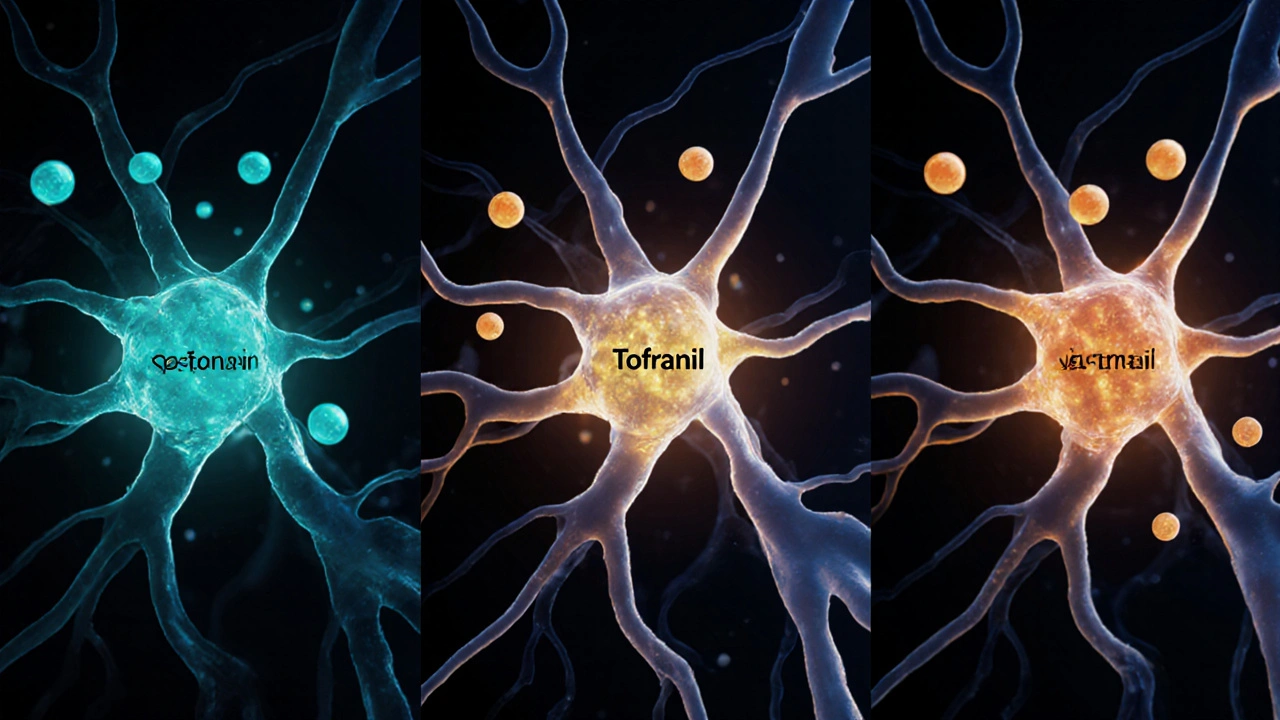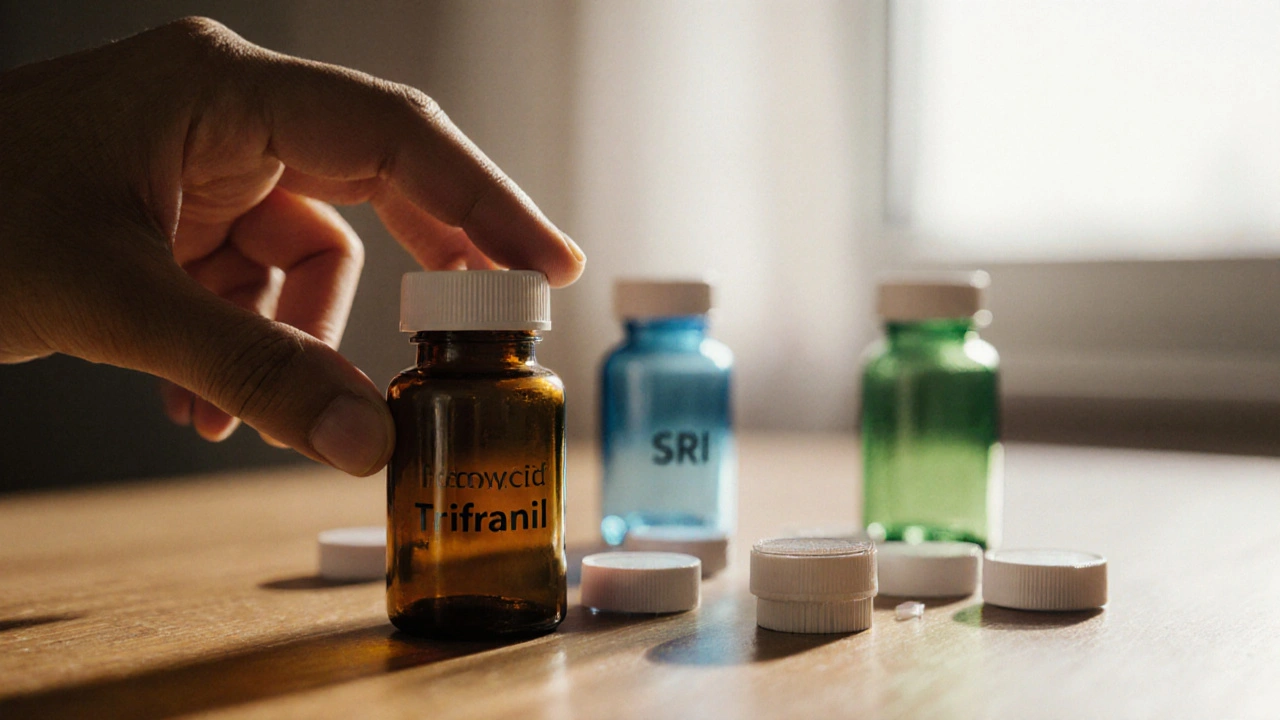When you or a loved one is diagnosed with major depressive disorder, the first question is often “which pill should I take?” The market is flooded with options, from decades‑old tricyclics to newer serotonin‑based drugs. This guide breaks down Tofranil (Imipramine) and lines it up against the most common alternatives you’ll hear about in a doctor’s office.
Key Takeaways
- Tofranil is a tricyclic antidepressant (TCA) that works by boosting norepinephrine and serotonin.
- SSRIs (e.g., sertraline) are usually first‑line because they have fewer side effects.
- SNRIs (e.g., venlafaxine) sit between TCAs and SSRIs in potency and side‑effect profile.
- MAOIs and atypical agents (e.g., bupropion) are reserved for specific cases or treatment‑resistant depression.
- Choosing the right drug depends on efficacy, tolerability, drug interactions, and personal health factors.
What Is Tofranil (Imipramine)?
Tofranil is a brand name for Imipramine, a tricyclic antidepressant used for depression and anxiety disorders. First approved by the FDA in 1959, it belongs to the older generation of mood‑lifting medicines that target both norepinephrine and serotonin reuptake.
Typical adult dosing starts at 25mg at bedtime, gradually increasing to a maintenance range of 150-300mg per day. Its therapeutic effect usually appears after 2-4 weeks, although some patients notice mood improvement sooner.
How Tofranil Works
The drug blocks the reabsorption (reuptake) of two key neurotransmitters-norepinephrine and serotonin-so more of them stay in the brain synapse, enhancing mood and alertness. Because it hits both pathways, Tofranil can be especially useful for patients whose depressive symptoms include low energy, poor concentration, and anxiety.
Common Alternatives to Tofranil
Modern prescribing trends favor newer classes, but each alternative has its own niche. Below are the most frequently mentioned options.
- Sertraline - a selective serotonin reuptake inhibitor (SSRI) widely considered first‑line.
- Venlafaxine - a serotonin‑norepinephrine reuptake inhibitor (SNRI) that adds norepinephrine to the serotonin boost.
- Phenelzine - a monoamine oxidase inhibitor (MAOI) reserved for atypical or treatment‑resistant cases.
- Bupropion - an atypical antidepressant that works on dopamine and norepinephrine, often used when sexual side effects are a concern.
- Amitriptyline - another TCA, similar to Tofranil but with a slightly different side‑effect profile.

Side‑Effect Snapshot
Every antidepressant carries risks. Here’s a quick look at the most common complaints for each class.
- TCAs (Tofranil, Amitriptyline): dry mouth, constipation, blurred vision, weight gain, cardiac conduction delays.
- SSRIs (Sertraline): nausea, insomnia, sexual dysfunction, mild weight changes.
- SNRIs (Venlafaxine): increased blood pressure, headache, sexual side effects, withdrawal symptoms if stopped abruptly.
- MAOIs (Phenelzine): hypertensive crisis with tyramine‑rich foods, dizziness, insomnia.
- Atypicals (Bupropion): insomnia, dry mouth, increased seizure risk at high doses.
Comparison Table
| Attribute | Tofranil (Imipramine) | Sertraline (SSRI) | Venlafaxine (SNRI) | Phenelzine (MAOI) | Bupropion (Atypical) |
|---|---|---|---|---|---|
| Drug Class | Tricyclic | Selective Serotonin Reuptake Inhibitor | Serotonin‑Norepinephrine Reuptake Inhibitor | Monoamine Oxidase Inhibitor | Dopamine‑Norepinephrine Reuptake Inhibitor |
| Typical Starting Dose | 25mg QHS | 50mg daily | 37.5mg daily | 15mg BID | 150mg daily |
| Time to Onset | 2-4 weeks | 1-3 weeks | 2-4 weeks | 2-4 weeks | 1-2 weeks |
| Common Side Effects | Dry mouth, constipation, weight gain, cardiac conduction delay | Nausea, sexual dysfunction, insomnia | Elevated BP, headache, sexual dysfunction | Hypertensive crisis with tyramine, dizziness | Insomnia, dry mouth, seizure risk (high dose) |
| Weight Impact | Often ↑ | Neutral or ↓ | Neutral | Neutral | Neutral or ↓ |
| Sexual Side Effects | Low | High | Moderate | Low | Low |
| Cost (US average $ per month) | ~$12 (generic) | ~$15 (generic) | ~$30 (generic) | ~$45 (generic) | ~$25 (generic) |
Deep Dive: Tofranil vs. Each Alternative
Tofranil vs. Sertraline (SSRI)
Sertraline is the go‑to first‑line drug for most clinicians because it has a mild side‑effect profile and minimal cardiac risk. Tofranil, on the other hand, can be lifesaving for patients who don’t respond to SSRIs, especially when fatigue and low motivation dominate the picture. The trade‑off is a higher chance of anticholinergic effects (dry mouth, constipation) and a need for ECG monitoring in patients with pre‑existing heart disease.
Tofranil vs. Venlafaxine (SNRI)
Venlafaxine adds norepinephrine to the serotonin boost, giving it a potency that sits between TCAs and SSRIs. If blood pressure is a concern, Tofranil may be safer because it doesn’t raise systolic pressure the way venlafaxine can. However, venlafaxine tends to cause less weight gain and may be better for patients worried about metabolic side effects.
Tofranil vs. Phenelzine (MAOI)
MAOIs are powerful but demand strict dietary restrictions to avoid hypertensive crises. Tofranil offers a similar neurotransmitter increase without the tyramine nightmare, making it a more practical choice for most people. Only when a patient demonstrates atypical depression symptoms (e.g., mood reactivity, hypersomnia) might a clinician consider an MAOI first.
Tofranil vs. Bupropion (Atypical)
Bupropion shines when sexual side effects are a deal‑breaker, because it rarely causes those issues. It also helps with smoking cessation. Tofranil doesn’t have that advantage, but it can be more effective for patients whose depression includes a heavy dose of anxiety. Bupropion’s seizure risk at high doses means it’s not the best fit for patients with a history of epilepsy.
Tofranil vs. Amitriptyline (Another TCA)
Amitriptyline is often prescribed for chronic pain or migraine prophylaxis in addition to depression. Its side‑effect fingerprint is similar to Tofranil, but it tends to be more sedating, which some patients find helpful at night. Tofranil is slightly more activating, which can be better for daytime functioning.

How to Choose the Right Antidepressant
Think of medication selection as a decision tree. Start with the primary symptom focus, then layer on health constraints, drug‑interaction risks, and personal preferences.
- Symptom profile: Predominant anxiety? Lean toward TCA or SNRI. Predominant low libido? Consider bupropion.
- Medical history: Heart conduction issues → avoid TCAs. Hypertension → watch venlafaxine. History of seizures → avoid bupropion high dose.
- Medication list: Look for serotonergic drugs that could trigger serotonin syndrome when combined with SSRIs or SNRIs.
- Lifestyle factors: If diet restrictions are a nightmare, skip MAOIs. If cost is a concern, generic TCAs and SSRIs are cheapest.
- Trial period: Most guidelines suggest a 6‑week trial at therapeutic dose before declaring a medication ineffective.
Work closely with your prescriber; they can order an ECG for TCAs, check blood pressure for SNRIs, or arrange dietary counseling for MAOIs.
Managing Common Side Effects
- Dry mouth: Sip water, chew sugar‑free gum, or use saliva substitutes.
- Constipation: Increase fiber, stay hydrated, consider a gentle stool softener.
- Weight gain: Pair medication with a regular walking routine and balanced meals; some clinicians add metformin off‑label for severe cases.
- Cardiac concerns (TCAs only): Baseline ECG, avoid other QT‑prolonging drugs, monitor for palpitations.
Frequently Asked Questions
Is Tofranil still prescribed today?
Yes. Although newer antidepressants dominate first‑line therapy, Tofranil remains a valuable option for patients who don’t respond to SSRIs or need a stronger norepinephrine boost. Many psychiatrists keep a low‑dose supply for treatment‑resistant cases.
How does the effectiveness of Tofranil compare to sertraline?
Clinical trials from the 1970s showed similar remission rates for TCAs and SSRIs when doses were optimized. Modern meta‑analyses suggest SSRIs have a slightly better side‑effect tolerance, while TCAs like Tofranil may work faster in patients with pronounced fatigue.
Can I switch from Tofranil to an SSRI safely?
A cross‑taper is recommended. Typically, you’d reduce Tofranil by 25mg every 3-4 days while starting sertraline at a low dose (25mg). Overlap for about a week minimizes withdrawal and serotonin‑syndrome risk.
What foods should I avoid with MAOIs like phenelzine?
Avoid aged cheeses, cured meats, fermented soy products, and over‑ripe fruits. Even a small portion of these can spike blood pressure dramatically when combined with an MAOI.
Is there a risk of addiction with Tofranil?
TCAs are not considered addictive in the classic sense. However, abrupt discontinuation can cause rebound depression and physical symptoms, so tapering is essential.
Bottom line: No single antidepressant works for everyone. Tofranil offers a strong, dual‑neurotransmitter lift but brings classic tricyclic side effects. Newer agents trade some potency for tolerability. Use the comparison table, weigh your personal health factors, and partner with a prescriber to find the best fit for your mood journey.

 Oct, 14 2025
Oct, 14 2025

Dorothy Anne
October 14, 2025 AT 14:18If you’ve been feeling stuck with the options, remember you’ve got more tools than a Swiss‑army knife. Start low, watch how your body reacts, and keep a symptom journal – it’s the fastest way to spot what actually lifts you.
Brufsky Oxford
October 15, 2025 AT 01:24Life’s chemistry is a dance of shadows and light; antidepressants are just the rhythm we try to catch. Choosing Tofranil over sertraline feels like picking a vintage vinyl over a streaming playlist – both have their charm, just different textures. :)
cris wasala
October 15, 2025 AT 12:31You’ve got this keep trying different meds find the one that clicks don’t give up it’ll work for you
Annie Thompson
October 15, 2025 AT 23:38There’s a certain melancholy that settles over anyone who has been handed a pharmaceutical menu that reads like a directory of half‑forgotten relics. The weight of history behind Tofranil is palpable, each capsule a reminder of an era when psychiatrists were more like alchemists. Yet that same weight can be a source of comfort, an assurance that the drug has survived decades of scrutiny. You may find yourself ruminating on the fact that while sertraline promises a whisper of serotonin, imipramine delivers a chorus of both serotonin and norepinephrine. It’s as if the latter offers a broader canvas for the brain’s chemistry to paint its moods. Some patients report that this broader spectrum translates into a faster rebound from the heavy fog of depression. Others, however, grumble about the anticholinergic side effects, the dry mouth that feels like desert sand in the throat, the constipation that turns bathroom trips into an ordeal. The cardiac implications, while rare, linger in the back of a prescriber’s mind, prompting an ECG before the first dose. Still, the occasional patient finds the very fact of having a tangible, measurable effect – a pulse of energy, a spark of motivation – enough to outweigh those inconveniences. I have spoken with people who say that the weight gain associated with TCAs feels like a price they’re willing to pay for the lift in mental clarity. And then there are those who, after a few weeks, say the side effects are a relentless reminder that they are on medication, a psychological burden of its own. The modern prefab of prescribing often leans toward SSRIs for their gentle side‑effect profile, but that gentle nature can also be a gentleness that leaves some people yearning for a more robust push. It’s a balancing act, a negotiation between efficacy and tolerability. One must also consider the context of comorbid anxiety, which Tofranil seems to address more directly than many SSRIs. The dual action can soothe the racing thoughts that often accompany depression. In the end, the decision is a personal one, weighted by individual physiology, lifestyle, and tolerance for side effects. It’s not a one‑size‑fits‑all, but a tailored suit cut to the contours of each patient’s experience. So when you stand before the pharmacy shelf, consider not just the brand name but the story behind each pill, the journey it’s taken, and the future it promises for your mind.
Parth Gohil
October 16, 2025 AT 10:44From a pharmacodynamic perspective the dual reuptake inhibition of imipramine offers a broader norepinephric boost compared to the selective serotonergic modulation seen in sertraline, which can be advantageous in cases where psychomotor retardation predominates.
VAISHAKH Chandran
October 16, 2025 AT 21:51Only the truly discerning understand that the antiquated allure of TCAs like Tofranil eclipses the pedestrian efficacy of modern SSRIs
Vicki Roth
October 17, 2025 AT 08:58I’m curious about the withdrawal timeline for Tofranil.
Chris Kivel
October 17, 2025 AT 20:04Switching gradually is key; taper the TCA while introducing the SSRI at a low dose to avoid any serotonin‑syndrome surprises.
sonia sodano
October 18, 2025 AT 07:11While the mainstream narrative glorifies sertraline as the golden standard, it’s worth noting that the neurochemical breadth of imipramine can actually outperform in patients with mixed‑type depression, a nuance the market loves to ignore.
Praveen Kumar BK
October 18, 2025 AT 18:18Let’s be clear the literature unequivocally shows that prescribing TCAs without baseline ECG monitoring is a negligent practice that borders on malpractice.
Viji Sulochana
October 19, 2025 AT 05:24i think the cost diff isn’t that big but the side effects can be a real hassle especially tha dry mouth
Stephen Nelson
October 19, 2025 AT 16:31Ah yes, because nothing screams ‘modern medicine’ like a 1960s tricyclic that makes you feel like you’re walking through a fog of antiquated optimism, right?
Marry coral
October 20, 2025 AT 03:38Why are doctors still pushing cheap pills like sertraline when they know Tofranil works faster for some people?
Jeffrey Lee
October 20, 2025 AT 14:44Honestly most of these tables are just fluff the real world data shows no huge difference except price and some side‑effects that most patients tolerate fine.
Ian Parkin
October 21, 2025 AT 01:51It is with great optimism that I observe the continued relevance of imipramine within contemporary psychiatric practice, particularly for treatment‑resistant cohorts.
Megan C.
October 21, 2025 AT 12:58Frankly the casual approach some clinicians take toward TCA prescription reflects a concerning lack of diligence in patient safety.
emma but call me ulfi
October 22, 2025 AT 00:04Both options have merit; the best choice really depends on individual health profiles and preferences.
Andy Lombardozzi
October 22, 2025 AT 11:11Take note: Tofranil’s anticholinergic profile demands careful monitoring, but when managed correctly it can provide a robust lift in energy and focus.
joseph rozwood
October 22, 2025 AT 22:18In the grand scheme of psychopharmacology this so‑called ‘comparison’ is nothing more than a superficial litany of stats that ignores the lived reality of side‑effect burden, making it a disservice to anyone looking for genuine guidance.